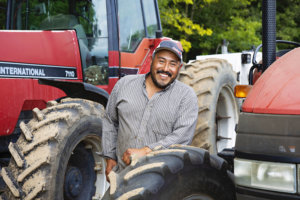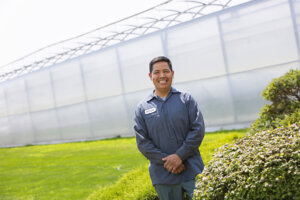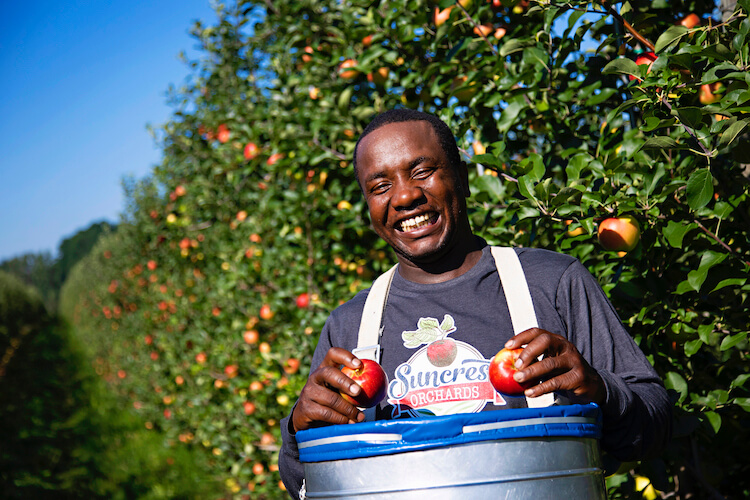The drive to build a better future for his family has been bringing Raymond O’Connor to Canada every year for almost a decade. Because of his job on an apple orchard in Norfolk County, the Jamaican construction worker has been able to send his kids to school, build a home for his family, and pay for medical care.
“I’ve been coming to Canada for eight years. I wanted a better life for my family and myself and Canada has helped us a lot,” he says, adding that although it’s hard to be away from home, he talks to his family every day.
That same desire fuels Marino Lopez Hernandez’ decision to work in Canada. He’s from the Mexican state of Puebla, where salaries are a fraction of what he is able to earn in Canada. Hernandez has worked at three different Canadian farms since first starting to come to Canada eight years ago; this past year marked his first season at DC Farms, a vegetable greenhouse near Windsor.
“My family gets sad when I come, but nowadays there is technology available to be more connected. Our economic situation is better than being in Mexico,” he says. “My life and the lives of my children has changed a lot because I work here. In the end, all of this is for their future.”
Fellow Mexican Carlos Rodriguez-Aburto farms with his father and brother near Veracruz where they grow coffee and watermelons. For the past 20 years, the father of three has also been putting his watermelon growing skills to work on a southern Ontario fruit and vegetable farm.
“Working here means more comforts for my family. It helps with school for my children, food, our house and everything like that. In Mexico, there isn’t much work,” he says.
O’Connor, Hernandez and Rodriguez-Aburto are among the 17,000 migrant workers who come to Ontario to work on fruit and vegetable farms through the Seasonal Agricultural Worker Program (SAWP) every year. SAWP was first launched in 1966 when Jamaicans came to Ontario to help with apple harvest. Today, the government-approved program is open to workers from Mexico, Jamaica, Trinidad & Tobago, Barbados and the Eastern Caribbean Islands.
Many more workers from other countries come to Canada under the agricultural stream of the Temporary Foreign Worker Program (TFWP) – but regardless of which program brings them to here, there’s no denying they’re an essential part of food production in this country.
The pandemic has put a spotlight on how important it is for countries to be self-sufficient, especially in food production. That can be a challenge in Canada where the climate means not all foods can be grown domestically, but leading fruit and vegetable producing regions like Ontario make sure they maximize the available growing season to produce as much local produce as possible during the spring, summer and fall.
According to the Ontario Fruit and Vegetable Growers’ Association, that wouldn’t be possible without the help of international workers like Marino, Carlos and Raymond. Many fruit and vegetable crops bruise or damage easily, so despite advances in automation, much of the work involved in planting, growing and harvesting still must be done by hand.
Critics of international farm worker programs point to long hours, hard work, and a lack of worker rights and protections. Given the relatively short seasons of some crops like asparagus or strawberries, a lot of work does sometimes have to completed very quickly – not unlike Black Friday madness in the retail sector or the busy December holiday season for restaurants.
But workers are far from being without rights, note both the industry and federal government, which has responsibility for migrant worker programs.
In fact, according to Foreign Agricultural Resource Management Services, which helps administer SAWP in Ontario, international workers have the same rights and privileges as Canadian workers, and their employers have the same obligations to them as they do for their Canadian employees. That includes, for example, minimum wage, health care, workplace insurance coverage and access to Employment Insurance.
“I really like the culture here in Canada and the people. They know that we come to contribute a lot to the economy, but also the people here give us a lot,” Hernandez says. “I am grateful to Canada and to the employers who have actually contributed a lot to Mexico and Central America. Much has changed in our lives and even more for the future of our children.”



